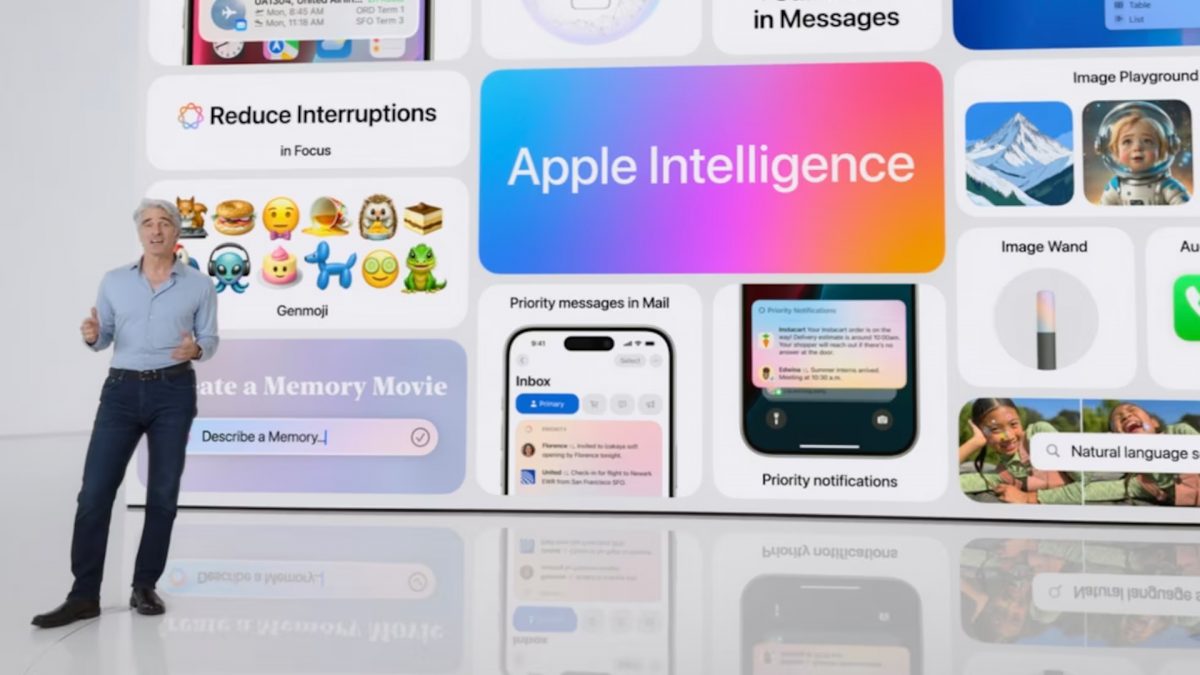Apple is unlikely to launch several key features — iPhone Mirroring, SharePlay Screen Sharing enhancements, and most crucially, Apple Intelligence — in Europe this year read more
)
the EU labelled Apple as a gatekeeper, requiring the company to make platform-level changes, such as allowing third-party app stores on the iPhone. Image Credit: Apple
This September, Apple is set to release significant updates with the introduction of Apple Intelligence and other new features in iOS 18, iPadOS 18, and macOS Sequoia. However, European users might not be able to access some of these exciting updates.
Apple’s new features, such as Math Notes in iPadOS, generative AI Genmojis, inline AI writing assistance, and advanced image editing tools, have been highly anticipated since their unveiling at the Worldwide Developers Conference (WWDC) 2024 in California. These innovations showcased Apple’s commitment to integrating artificial intelligence into its products, thrilling developers and users alike.
Initially, it seemed that these AI features would be available worldwide, with the understanding that they would work in US English. However, it turns out that the rollout in Europe faces significant obstacles due to regulatory issues, particularly the EU’s Digital Markets Act (DMA).
The DMA aims to ensure that major tech companies like Apple, Google, Amazon, Meta, and Microsoft do not misuse their market power. Last year, the EU labelled Apple as a gatekeeper, requiring the company to make platform-level changes, such as allowing third-party app stores on the iPhone. Apple complied, albeit reluctantly, leading to a strained relationship with European regulators.
Now, due to these regulatory challenges, Apple is unlikely to launch several key features — iPhone Mirroring, SharePlay Screen Sharing enhancements, and most crucially, Apple Intelligence — in Europe this year.
Apple explained its position in a statement to TechRadar: “Due to the regulatory uncertainties brought about by the Digital Markets Act (DMA), we do not believe that we will be able to roll out three of these features — iPhone Mirroring, SharePlay Screen Sharing enhancements, and Apple Intelligence — to our EU users this year.”
Apple’s primary concern is that the interoperability requirements of the DMA might force the company to compromise the integrity of its products, potentially affecting user privacy and data security. Apple emphasized its commitment to user safety and privacy, stating that it is working with the European Commission to find a solution that would allow these features to be introduced without compromising these principles.
Apple’s focus on privacy is evident in its new AI products. The company has introduced the concept of Private Cloud Compute, where its largest generative models will reside, ensuring the same level of data privacy and security whether the models operate locally or in the cloud. Apple fears that if the EU demands interoperability with third-party cloud providers, it could undermine these protections.
Interestingly, while the DMA specifically designates Apple as a gatekeeper for iOS and iPadOS, macOS is now also affected due to the new iPhone mirroring feature, which allows users to display their iPhone screen on a Mac. This feature was well-received for its innovative approach but now faces regulatory scrutiny.
Despite the challenges, Apple is still in discussions with the EU to reach a compromise. The company hopes that an agreement might be reached in time for the launch of Apple Intelligence later this summer. However, it seems unlikely that a resolution will be found in time for the planned beta release of iPhone Mirroring and SharePlay screen-sharing updates on June 24.
The situation underscores the complex relationship between tech giants and regulators, particularly in the EU. Apple’s predicament highlights the broader tension between innovation and regulation, as companies strive to introduce cutting-edge technologies while complying with stringent regulatory frameworks.
As the tech world eagerly anticipates the rollout of these new features, European users may have to wait a bit longer to experience the full benefits of Apple’s latest advancements. The ongoing negotiations between Apple and the EU will be crucial in determining when, and if, these features will be available to users in Europe. For now, the rest of the world will get a taste of Apple’s AI-driven future, while Europe remains on standby.

 2 months ago
28
2 months ago
28
)
)
)
)
)
)
)
)
)
)
)
)
)
)
)
)
)
)
)
)
)
)
)
)
 English (US) ·
English (US) ·